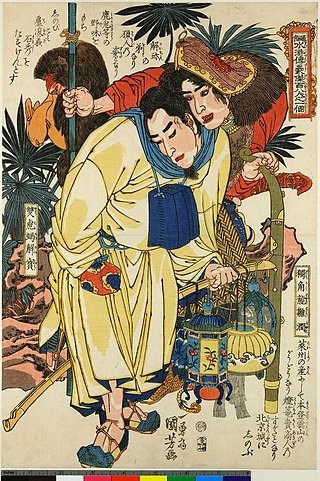
Xie Bao is a fictional character in Water Margin, one of the Four Great Classical Novels in Chinese literature. Nicknamed "Twin-tailed Scorpion", he ranks 35th among the 36 Heavenly Spirits, the first third of the 108 Stars of Destiny.

Zou Yuan is a fictional character in Water Margin, one of the Four Great Classical Novels in Chinese literature. Nicknamed "Forest Emerging Dragon", he ranks 90th among the 108 Stars of Destiny and 54th among the 72 Earthly Fiends.

Zou Run is a fictional character in Water Margin, one of the Four Great Classical Novels of Chinese literature. Nicknamed "Single Horned Dragon", he ranks 91st among the 108 Stars of Destiny and 55th among the 72 Earthly Fiends.
Wang Zhong was a military general of the state of Cao Wei during the Three Kingdoms period of China. He previously served under the warlord Cao Cao in the late Eastern Han dynasty.

Romance of the Three Kingdoms is a Chinese television series adapted from the classical 14th century novel of the same title by Luo Guanzhong. The series was produced by China Central Television (CCTV) and was first aired on the network in 1994. It spanned a total of 84 episodes, each approximately 45 minutes long. One of the most expensive television series produced at the time, the project cost 170 million yuan. It was completed over four years and involved over 400,000 cast and crew members, including divisions of the People's Liberation Army from the Beijing, Nanjing and Chengdu military regions. Some of the dialogue spoken by characters was adapted directly from the novel. Extensive battle scenes, such as the battles of Guandu, Red Cliffs and Xiaoting, were also live-acted.
Betty Pei Ti is a Taiwanese actress. Though born in Taiwan, she is best known for her roles in Hong Kong films, particularly of the Shaw Brothers Studio.
Tang Guoqiang is the highest ranking actor in China. He is best known for portraying historical figures in several films and television series. Some of his more notable roles include: various Chinese emperors, Zhuge Liang, Yan Zhenqing and Mao Zedong. Tang started his acting career when he first joined a performance troupe in 1970 after graduating from middle school. He made his film debut in 1975 as the male lead in Storm over the South China Sea. He is also a member of the Chinese Calligraphy Society. He has starred in over 30 movies and over 40 TV dramas, and is the most influential super stars of all time in the Chinese mainland.
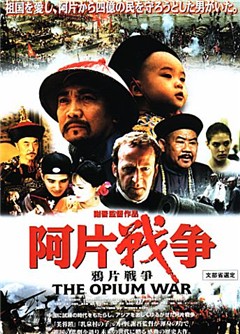
The Opium War (鸦片战争) is a 1997 Chinese historical epic film directed by Xie Jin. The winner of the 1997 Golden Rooster and 1998 Hundred Flowers Awards for Best Picture, the film was screened in several international film festivals, notably Cannes and Montreal. The film tells the story of the First Opium War of 1839–1842, which was fought between the Qing Empire of China and the British Empire, from the perspectives of key figures such as the Chinese viceroy Lin Zexu and the British naval diplomat Charles Elliot.

The Water Margin is a 1998 Chinese television series adapted from Shi Nai'an's classical 14th-century novel of the same title. It was produced by CCTV with Zhang Jizhong as producer. It was first broadcast in China in January 1998. The series also featured action choreography by Yuen Woo-ping.
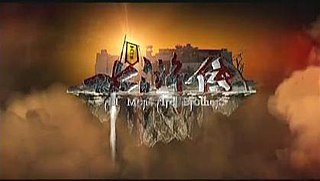
All Men Are Brothers is a 2011 Chinese television series adapted from Shi Nai'an's 14th century novel Water Margin, one of the Four Great Classical Novels of Chinese literature. The series is directed by Kuk Kwok-leung and features cast members from mainland China, Taiwan and Hong Kong. The series was first broadcast on 8TV in March 2011 in Malaysia.

Initiating Prosperity is a Chinese historical television series based on events in a period in Chinese history known as the Transition from the Sui dynasty to the Tang dynasty. The series was directed by Wang Wenjie and starred Shen Xiaohai, Liu Wenzhi, Zhang Zijian, Sun Feifei and Bao Guo'an. It was first broadcast on television stations in China in 2006.

The Patriot Yue Fei is a 2013 Chinese television series based on the life of Yue Fei, a Song dynasty general widely regarded as a patriot and culture hero in Chinese culture for his role in defending the Song empire against the Jurchen campaigns. While the plot is based on historical sources and descendants of the general served as consultants, it also includes elements of fiction and draws ideas from the novel General Yue Fei (說岳全傳) and other folktales on his life.

Empresses in the Palace is a 2011 Chinese television series based on the novel of the same name by Liu Lianzi. Directed by Zheng Xiaolong, it stars Sun Li in the title role.
Carter Wong is a Hong Kong actor and martial artist, who is mainly known for roles in Kung Fu action movies. The biggest movies he was featured in are Big Trouble in Little China (1986), and Yong zheng ming zhang Shao Lin men (1977). As an actor, he contributed to more than seventy martial arts films. He also worked as a stuntman in films, and was the fighting instructor for the movie Rambo III. Wong is still active in martial arts.

Cao Cao is a Chinese television series based on the life of Cao Cao, a warlord who rose to power towards the end of the Eastern Han dynasty and laid the foundation for the state of Cao Wei in the Three Kingdoms period. Directed by Hu Mei, the series aimed to portray a more historically accurate image of Cao Cao, who is traditionally depicted as a villain in Chinese culture. Starring Zhao Lixin as the eponymous character, the series was filmed at the Xiangshan Film City in Ningbo, Zhejiang between 1 November 2011 and 15 March 2012.
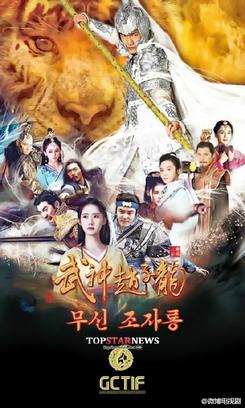
God of War, Zhao Yun, also known as Chinese Hero Zhao Zilong, released under the title Dynasty Warriors in Indonesia, is a 2016 Chinese television series directed by Cheng Lidong and produced by Zhejiang Yongle Entertainment Co., Ltd. The series starred cast members from mainland China, South Korea and Taiwan: Lin Gengxin, Im Yoon-ah and Kim Jeong-hoon. The story is loosely adapted from the 14th-century Chinese classical novel Romance of the Three Kingdoms, with Zhao Yun as the main character. It was first aired on Hunan TV from 3 April to 7 May 2016.
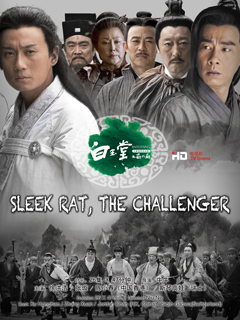
Sleek Rat, the Challenger is a 2013 Chinese wuxia-mystery television drama series based on Tan Ge's (谈歌) 2006 novel The New Legend of Bai Yutang (新白玉堂傳奇). The show stars Xu Honghao as the "Sleek Rat" Bai Yutang, a superb knight-errant during the 11th-century Song dynasty. Many characters come from either the 19th-century novel The Seven Heroes and Five Gallants or the Generals of the Yang Family legends, but the story is completely new.

The King of Romance is a 2016 Taiwanese television series created and produced by Eastern Television. It stars Lego Li, Cindy Lien, Gabriel Lan and Serena Fang. First original broadcast began on December 3, 2016 on TTV airing every Saturday night at 10:00-11:30 pm.

The Advisors Alliance is a 2017 Chinese two-part television series based on the life of Sima Yi, a government official and military general who lived in the late Eastern Han dynasty and Three Kingdoms period of China. The series starred Wu Xiubo as the main character, with Liu Tao, Li Chen, Janine Chang, Tang Yixin, Yu Hewei and Wang Luoyong playing supporting roles. The first part of the series started airing on Jiangsu TV and Anhui TV on 22 June 2017. The second part started airing on Youku on 8 December 2017.

Wang Fulin is a Chinese television director and producer best known for his work Dream of the Red Chamber and Romance of the Three Kingdoms, both adapted from Four Great Classical Novels of Chinese literature.















